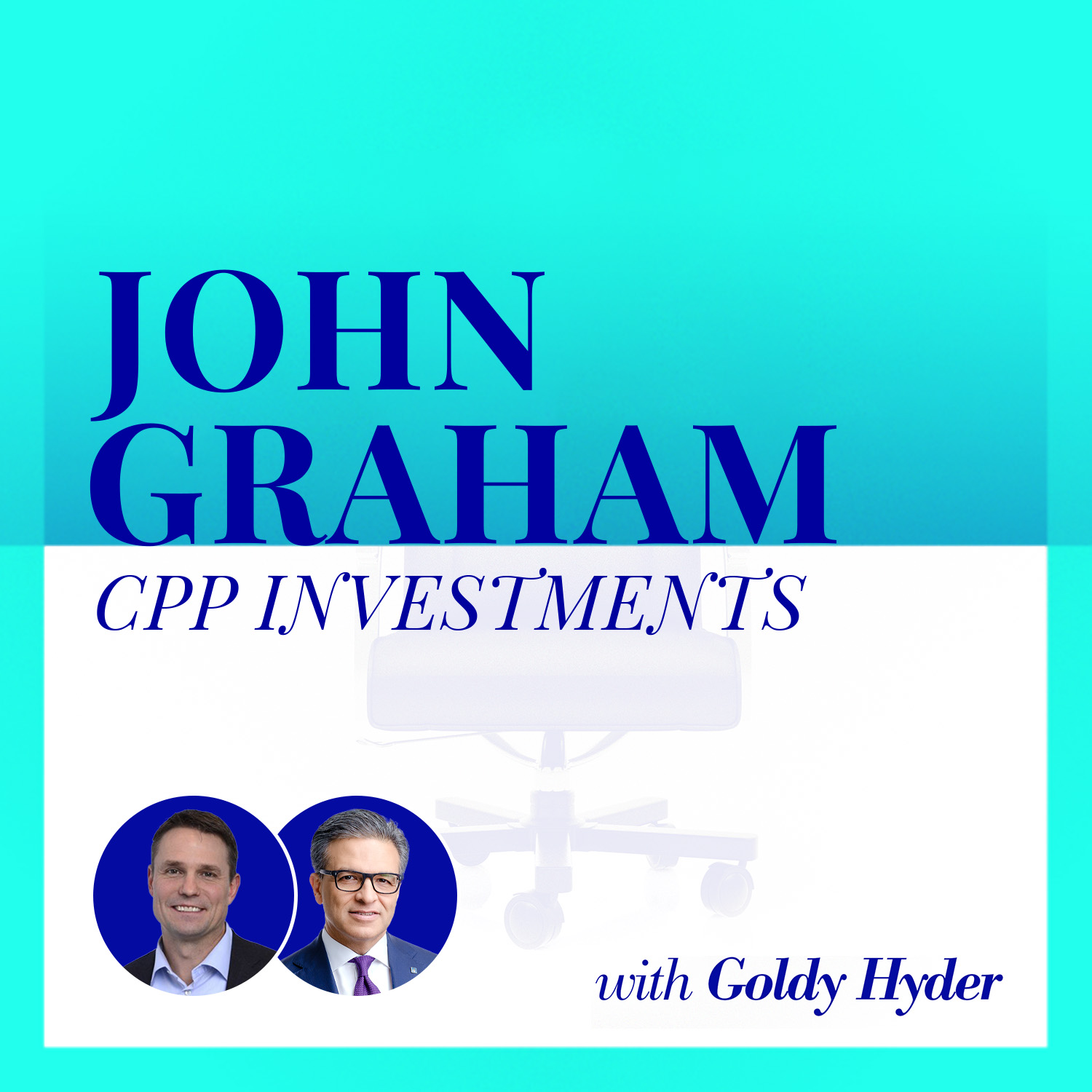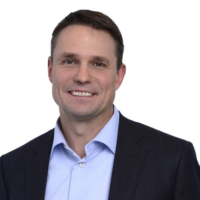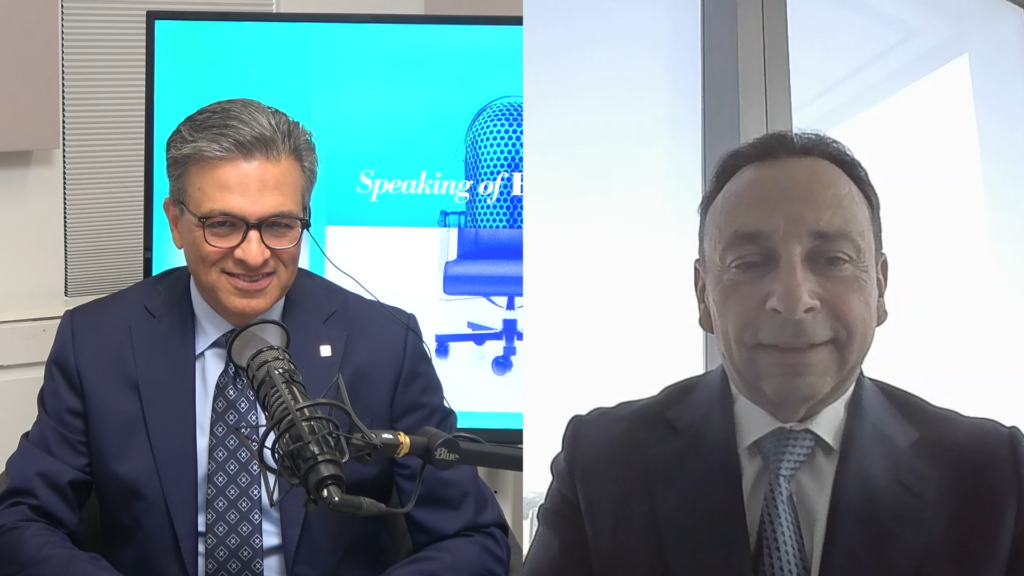The man who oversees the $650-billion pension portfolio of millions of Canadians started out his career in the relative safety of a chemistry lab.
Back then, John Graham was a research scientist with a PhD in physical chemistry. He spent nine years working in a lab before he jumped from the world of science to the world of finance, joining CPP Investments.
Now, as president and CEO of one of the world’s largest pension funds, he recognizes that investing in financial markets is more art than science.
“One of the few things I definitively know today is I don’t do science anymore,” he tells Goldy Hyder on the Speaking of Business podcast. “Finance is about investing in the real world, in a system that is constantly in flux, constantly changing. At times it can be irrational, requires quantitative, qualitative methods, art … and some science.”

Speaking in front of an audience at the Toronto Global Forum in October, Graham discusses how CPP Investments has adapted and grown in its 25-year history, navigating through changing circumstances.
Taking the long view, he says, means avoiding getting swept up in FOMO (fear of missing out) but instead building a stable, long-term portfolio. “Canadians should be proud that CPP investments is either the number one or two best-performing pension plans in the world.”
John Graham:
Canada is one of the few countries that actually has a functioning national pension system. Now, we’re obviously biased at CPP investments, but we do think it’s something that Canadians should be very proud of.
Goldy Hyder
Welcome to Speaking of Business – conversations with Canadian innovators, entrepreneurs and leaders.
I’m Goldy Hyder, president and CEO of the Business Council of Canada.
I don’t need to tell you that we are living in a world of rapid change.
Whether it’s political, technological, environmental, or social …the PACE of change is only accelerating.
It can make it hard to plan ahead and take the long view. But that’s exactly what John Graham has to do.
As the president and CEO of Canada Pension Plan Investments, he oversees the pension portfolio of millions of Canadians. His mandate is clear – make sure that when a contributor retires, their pension will be waiting for them.
So how does that happen in the backdrop of massive disruption around the world?
A few weeks ago I had the opportunity to speak with John in front of an audience at the Toronto Global Forum. It marks John’s second appearance on the Speaking of Business podcast. And we had a lot to catch up on.
Here’s that conversation.
Interview:
Goldy Hyder
Since you were last here, a lot has happened, and is happening, and is going to continue to happen. So we’ve got a lot of ground to cover, and I want to start off by, let’s just get all the numbers out of the way here, because I know you’re a numbers guy. Tell us, where’s the fund at? There’s people in the room who just want to know that their money’s good. How are you doing with that?
John Graham
We’re doing well. As of the last actuarial review, CPP is sustainable for at least 75 more years. And the fund today sits at about $650 billion of assets under management.
Goldy Hyder
And the return these days?
John Graham
Our five-year return hovers around 9%. Our 10-year return around similar, 9%.
Goldy Hyder
Those are good numbers, right?
John Graham
Yeah, it’s good numbers for the asset base.
Goldy Hyder
Yeah, they’re excellent numbers.
John Graham
For a big asset base.
Goldy Hyder
Well, let’s talk about how that happens. You are a scientist, actually, people may or may not know that. You’re a PhD in physical chemistry. I’ve never called you Dr. Graham.
John Graham
Very few people do.
Goldy Hyder
I feel like I’ve not given you the credit that you deserve. Now, you’re in charge of the retirement savings of millions and millions of Canadians. I wonder, is investing a science or an art?
John Graham
For people’s benefit, I started my career as a research scientist, and worked as a bench scientist for nine years before moving over to finance, and loved it, and loved science. One of the few things I definitively know today is, I don’t do science anymore. It’s one of the few things I know for sure. In science, somebody in New York could do an experiment and get the same answer in Paris. Finance is about investing in the real world, about investing in a system that is constantly in flux, constantly changing, at times, can be irrational, requires quantitative, qualitative methods, art and some science.
Goldy Hyder
Okay, one of the things that I’d read is you had described, in some ways, a CPPIB is a supertanker. That would make you the captain of the supertanker. What did you mean by that?
John Graham
I described the portfolio, in some ways describe it aspirationally, as a supertanker, in that what we need to do is ensure that the portfolio is a supertanker. What I mean by that is, we invest in the global capital markets. They can be volatile, and it can be rough, and that portfolio needs to push through things. It can’t be pushed around by things. It needs to push through the volatility, it needs to push through the geopolitics, it needs to push through. It really stems back to who we are as an organization, and I think it’s one thing that is really embedded in how we invest the money. CPP Investments is not a wealth creation vehicle. It is not a wealth maximization vehicle. It’s a pension plan, and we need to manage the money in the best interest of the contributors and beneficiaries. Every paycheque, Canadians have money taken off their paycheque, and what they get in return for that is a promise.
A promise that at some point in the future, whether that be 10 years, 20 years, 30 years from now, they will get a paycheque, and they will get a paycheque for the rest of their life. I hope they live to 110, I hope they live to 120, and they will get a paycheque for the rest of their life, and it’ll be inflation protected. And as we’ve learned over the past few years, inflation is real. The way we think about managing that portfolio is, we need to make sure that promise is kept, which means that supertanker needs to push through the volatility. It’s not going to go up when the markets go ripping, and it’s not going to go down when the markets tank. We need to build something that is solid and sustainable and resilient, and just pushes through.
Goldy Hyder
But that doesn’t happen void of change. There’s a lot of change going on. You just joked about maybe living to 100, and people are going to live to 110, as AI and other things kick in. We still retire early, and public policy impacts some of these things. How do you feel about some of the conversations that have taken place, not just here in Canada? We saw what took place in France, and we had a government here who made it 67. This government chose to drop it back to 65. In France, it was like a revolution. They were literally on the streets because they were expected to work a little bit longer. How do you manage that?
John Graham
We have a very specific mandate. It’s enshrined in federal legislation, the CPPIB Act, and it says we need to invest the funds to maximize return without undue risk of loss, taking into account the factors that impact the funding of the plan, and do that in the best interest of contributors and beneficiaries. That’s how we manage the plan. Whatever the contribution rate, whatever the benefit rate, to be clear, we don’t manage CPP. That’s the stewards, that’s the provincial stewards, the federal stewards, they manage the CPP. They set the benefits and they set the contributions. Our job is to execute on that with respect to our mandate. I mentioned the promise, and I have some colleagues here. I think this is something that we really focus on. Our job is to do everything we can to keep that promise. Many promises in the pension world aren’t met around the world. Canada is one of the few countries that actually has a functioning national pension system. Now, we’re obviously biased at CPP investments, but we do think it’s something that Canadians should be very proud of.
Goldy Hyder
As I said, a lot of that has not happened in a vacuum. There’s a lot of things that have been happening that have made that harder to do. You’ve seen, in your time and the time of the pension plan, technologically things have changed, economically things have changed, socially things have changed, politically, they’re changing, even more than perhaps before, geo economics, geopolitical risks, and you’ve got to take the long view, as you’ve always said. How are you managing all of this change, and how is the CPPIB managing, in an organized way, this radical change environment we find ourselves in?
John Graham
Well, that’s what makes the job so interesting, is the amount of change, and trying to navigate through it. A few of our fundamental beliefs, a few of our fundamental core tenants in how we manage the money, one is, focus on the long term, and really think about investing for the long term. Build a portfolio that you have conviction is the right portfolio over the time horizon that matters for the organization, and don’t get swept up in FOMO. Don’t invest in crypto, and don’t get swept into things that are the-
Goldy Hyder
Trendy stuff.
John Graham
The trendy stuff of the day. It is remarkable to me that one of the biggest mistakes investors make is FOMO, even some of the best investors I’ve ever met.
Goldy Hyder
Everybody knows what FOMO is, right?
John Graham
Fear of missing out. Get caught up in the trend of the day. Focus on the long term, focus on building a portfolio that you have conviction in over the long term. One of the other areas that we are big believers in, and it does get to what you were talking about with demographics and everything, is diversification. Build a diversified portfolio, build a portfolio that is diversified across asset classes, across geographies. It’s very hard to forecast and predict in the short term, but that diversification will be beneficial in the long run.
Goldy Hyder
In that backdrop, has risk tolerance, or the way you come at risk changed? With everything that I just mentioned that’s going on, the old saying is, you focus on what you control, and of the things I mentioned, you control very little of that. How do you manage risk in that backdrop?
John Graham
Well, we do manage risk very well, and we do have a very, very strong risk management framework in place. Actually, this is one of my other investing views. You’ve got to stay invested. You can’t time the market, really hard to time the market. We have a risk tolerance. We have a risk target for the organization, and we maintain that risk, and we hold it through the cycle. We keep rebalancing the portfolio to that risk level with a belief that it is important to be on risk at a level you’re comfortable with through the cycle, and don’t try to time the market. Now, if I think through the history of the organization, and we’re only 25 years old. We say 25, even though the legislation is 1997, and when the provinces and the federal government came together, it was 1995, to create CPPIB. We say it’s 1999 because we got our first cheque in 1999. We got our first cheque for $12 million.
As I said, now we did get other cheques. We didn’t turn $12 million into $650 billion. We did get other cheques. In the portfolio today, of the $650 billion, $432 billion is investment income, over two-thirds is investment income. That machine works of exposing the capital to the capital markets, and growing the asset base. Now, we did it through a crawl/walk/run approach. When we first started out, we slowly transitioned from passive to active. We slowly started to build capabilities to where we are today, which is, I think, one of the more sophisticated institutional investors in the world. Again, I think one thing Canadians should be proud of, that CPP investments is either the number one or two best-performing pension plans in the world.
Goldy Hyder
That’s a great place for me to point out that in many ways, CPPIB is an example of policymakers that are solving a public problem with a private sector solution. We should think about that more in terms of other ways that we can do that. Is this the right model because it’s working in Canada? What do you hear from other pension plan managers, and others in your role, to say, “Boy, we wish we had your system,” or are there things that you’ve seen in other parts of the world where you go, “Boy, that would be a great add for us here?”
John Graham
One thing with CPP investments, CPP was created in a crisis. CPP was created in the 1960s, when senior poverty was a real issue. CPPIB was created in the mid-1990s, when the provinces and the federal government came together and said, “We’ve got a problem. This is on a path to be unsustainable.” What I think is remarkable, Goldy, is provinces and the federal government came together in the mid-1990s, said, “There’s going to be a problem that the CPP will essentially go insolvent in 2016, 21 years from now, but we know we’ve got to fix it today. We can’t wait until 2015 to fix it. We’ve got to fix it today.” They made some difficult choices, made some painful choices, increased the contribution rate, decreased the benefits, and then created CPP Investments, a third party, arm’s length institution to manage these surplus funds of the CPP, and then enshrined that in federal legislation.
Goldy Hyder
The elephant in the room that I’m sure people are saying, “When’s he going to get to the good stuff?”
John Graham
This is all good stuff.
Goldy Hyder
This is all good. Well, look, there’s been this conversation that’s been taking place in the public discourse, where some have said that the Canadian pension plan effectively should give a hometown discount, and do more in Canada than it’s currently doing. How do you respond to that?
John Graham
I’ll share a perspective, and I’ll take a glass half full on this. Canada is our second-biggest market in the portfolio. It’s an important market for us, one we’ll continue to invest in. Our largest asset in the portfolio is here in Ontario, and we think it will continue to be a really important market to invest in. In this debate, we have been very engaged, and we’ve been engaged with all levels of stakeholders across the country. Our focus is on, how do you make Canada more investable? How do you actually make Canada more investable? The world has a lot of capital. Whether it be the Singaporeans, the Australians, the Middle Eastern funds, there’s a lot of capital, and capital’s actually pretty mercenary. It’s like water rolling down the hill. It’ll find the path of least resistance. If there’s good opportunities, capital will come, and it’s about setting the table for the capital.
We are actively engaged, and we are, I think, very constructively contributing to this debate and discussion on how do we make Canada more investable, which is in everybody’s best interest. I would take the opportunity, Goldy, to also just share that, I mentioned with the CPPIB Act, when CPPIB was created, we were created with a sole fiduciary mandate to invest the funds in the best interest of the contributors and beneficiaries, and to maximize return without undue risk of loss, taking into account the factors that impact the plan. That’s the mandate in federal legislation, and that’s the mandate I have to follow as the CEO of CPP Investments.
Goldy Hyder
I’m curious, have you heard from pensioners who say, “Don’t you dare give anybody a hometown discount? I want the best ROI.”
John Graham
Two things that are very emotional, pensions and healthcare. Pensions are very emotional.
Goldy Hyder
Have you heard from them?
John Graham
I hear from a lot of people.
Goldy Hyder
Well, look, in all seriousness, you have that fiduciary duty that you’ve just laid out, which means, you look to invest in countries whose economies are growing. Isn’t it incumbent for Canadians to create the conditions where you feel confident investing other people’s money in an economy that’s growing?
John Graham
Yeah, and as I said, Canada is our second-biggest market in the portfolio. It’s our second-biggest market, and we do see lots of great opportunities domestically, but there’s always opportunities, as an investor, to make it more attractive to capital.
Goldy Hyder
Do you feel like you have the space that you need, then, to navigate through this issue?
John Graham
Do I feel I have the space?
Goldy Hyder
Do you have the space? This is still, at the end of the day, an entity that was created by government. It may be arm’s length, yes, but we’ve seen how far that can go sometimes. Do you have the space to do what you need to do, and make the right decisions for the people whose money you’re managing?
John Graham
CPP investments, it’s a provincial/federal construct. The stewards of the CPP are the provincial and the federal finance ministers, and the stewards of the CPP have always protected and acted in the best interest of CPP and CPP Investments. There’s a difference between what’s in the media and how the stewards protect the organization.
Goldy Hyder
There’s a perfect storm brewing here when it comes to demographics, in terms of aging. We have a very low birth rate. We’re down to 1.3 children per family. That’s amongst the lowest it’s been. Is there enough money to sustain this plan, or is there people coming along that are going to pay to make sure that I get a pension when I’m ready?
John Graham
It’s sustainable for 75 more years, and one of the other concepts that is really embedded into the CPP is this concept of intergenerational fairness. This is, especially going forward, you can’t have one generation paying for another. You’ve got to pay your way. One thing with the CPP that’s also just important is, it’s a pension plan. It’s not OAS, it’s a pension plan. You’ll hear us say that we’re here to contribute to people’s security and retirement, to allow them to live in dignity at a time when they’re most vulnerable. When they get their CPP cheque, they earned it, because they contributed to it. It’s a pension plan. They earned that.
Goldy Hyder
Do you feel their anxiety, about being worried about their retirements?
John Graham
We do, and I think we work at CPP Investments because we feel the anxiety. This is part of the purpose of the organization. I will share some numbers with you, because you said I’m a numbers person. CPP, not to get too detailed into how CPP works, but it’s a hybrid plan, which means there’s an asset base, but it’s largely a pay as you go plan, which means money comes in and goes straight out. As of the last actual review, in December ’21, the plan sat at about $540 billion. The present value of the accrued benefits was $1.7 trillion. We are investing in the best interest of contributors and beneficiaries. There’s a lot of dependencies in these plans, and everyone at CPP Investments understands that we have to invest this money, and we have to do the best job we can.
Goldy Hyder
I want to wrap on the fact that probably half this room is approaching retirement age in the next decade or two. The other half of the room is sitting here going, “Oh my God, I have to pay for all of this stuff.” Quite a group of young people in here. You just became an empty nester. You and I have talked a lot about our kids. I want to just ask you, as we wrap, when you look to your children, what worries you about the world in which they’re going to grow up, and also, what gives you hope and optimism in the world in which they’re going to grow up?
John Graham
My wife Melissa and I, we just became empty nesters. Our youngest one-
Goldy Hyder
So happy.
John Graham
We’ve realized we’re going to be okay. We are going to be okay. It’s going to be okay. They’re actually back this week, because apparently now, you get a week off in the fall, too. We’re asking when they’re going back to school. What worries me the most? I think about the amazing career I’ve had, and I think about the memories I’ve had, and some of the best memories I’ve had in my career are being able to travel the world, break bread, develop friendships with people from all over the world, from different cultures, from different countries, where you developed relationships, developed bonds, where you focused on, what do we have in common as opposed to what is different? I worry my kids won’t grow up in that world, that in their professional career, they won’t have those same experiences. They won’t be able to have this global career where they can develop these friendships, where going forward, relationships might be more based on what’s different as opposed to what is common.
It makes me sad a little bit for them, because I think back through my professional career, and it’s some of the best memories that I have. What excites me, actually, is AI. I don’t know what it’s going to be. I have no idea. But what excites me is to see what people are going to do with it, is to see the ingenuity, the human spirit. People are going to take this technology and do incredible things, and they’re going to do terrifying things, but it’s going to be incredible to watch, and that’s what excites me.
Goldy Hyder
Well, look, you weren’t terrifying. You were incredible. Please join me in thanking John Graham, CPPIB.
John Graham
Thank you, Goldy.
Goldy Hyder:
John Graham is the president and CEO of CPP Investments. We recorded that conversation in mid October in front of an audience at the Toronto Global Forum.
If you’re a newcomer to the podcast, welcome. I hope you will subscribe and please take the time to give us a review.
Search for Speaking of Business wherever you get your podcasts … or just go to our website at the business council dot ca slash podcasts.
While you’re there you can check out photos from our recordings and listen to some of our other conversations.
Until next time, I’m Goldy Hyder. Thanks for joining us.










